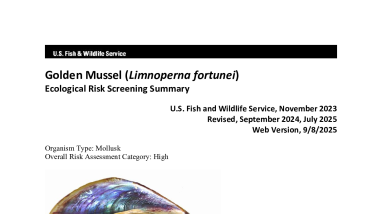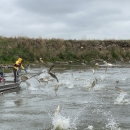Species that are considered high risk have a well-documented history of invasiveness in at least one location globally and are of establishment concern for the contiguous United States based on a climate matching analysis.
Limnoperna fortunei, the golden mussel, is a mussel native to China and Southeast Asia. L. fortunei is a mussel that has a broad tolerance of water conditions and its populations can become very dense in some areas. It has been introduced to other countries in Southeast Asia as well as South America where it has become established. Negative impacts, such as macrofouling, water clarity alteration, displacement and diet alteration of other species have been reported from these areas. Within the United States, L. fortunei was found in California in 2024; understanding of the current distribution within the state is still expanding. Regulations for this species exist in Illinois, Michigan, Nevada, Ohio, Texas, and Wisconsin. The history of invasiveness for L. fortunei is classified as High due to the records of established nonnative populations and documented negative impacts. The climate matching analysis for the contiguous United States indicates establishment concern for this species. The highest matches were recorded in central and southern California, the Southeast up to the Mid-Atlantic region, and the North-Central region. Some areas of the northern Pacific Coast, western mountain ranges, and the Northeast recorded the lowest matches. The Certainty of Assessment for this ERSS is classified as High due to the quality of information available. The Overall Risk Assessment Category for Limnoperna fortunei in the contiguous United States is High.



